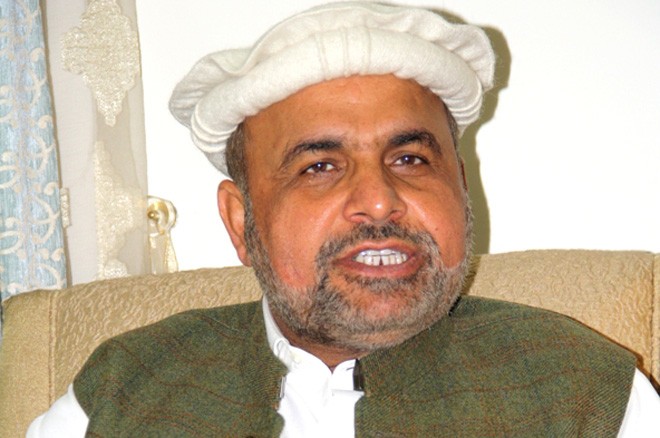
Shahjee Gul Afridi on what the charter of demands means to the tribal political parties

The News on Sunday: There are 19 members of parliament from Fata, including 11 MNAs and eight Senators (One National Assembly seat from Kurram Agency is vacant). How many among them are firmly supporting the bill?
Shahjee Gul Afridi: All of us are united in support of our seven-point charter of demands. It has been signed by all 19 tribal members of parliament. These include honourable return of internally displaced persons (IDPs) from Fata to their homes so that peace is restored, doing away with Article 247 of the Constitution and turning Fata into a separate province, merging it into Khyber Pakhtunkhwa or giving Fata the status of elected executive council, ensuring respect for "chaddar aur chardiwari" (honour of the people) in Fata.
The demands also include giving representation to Fata in NFC and IRSA on the advice of tribal parliamentarians, establishing a Fata Regiment in Pakistan army as has been done in case of the other provinces/federating units, abolishing the "rahdari" (passage) and permit system in Fata and legalising the income earned from the on-border movement of goods to tackle corruption and terrorism just like other parts of Pakistan, and bringing the planning and development and other line departments under the control of tribal MNAs and Senators until the abovementioned reforms are put in place.
TNS: Aren’t you proposing three options regarding the future status of Fata? You aren’t straightaway calling for merger of Fata into Khyber Pakhtunkhwa as is being widely believed?
SGA: That is true. We have proposed the three options and are now waiting for the response of the government. Due to constitutional hitches, we couldn’t propose in the bill that Fata should become a separate province or be managed by an elected executive council. Therefore, we have mentioned Fata’s merger into Khyber Pakhtunkhwa. We need constitutional amendment and the approval of President of Pakistan to make all this happen.
TNS: A number of people rejected the proposal for Fata’s merger into Khyber Pakhtunkhwa. Aren’t some tribal parliamentarians also opposed to the merger?
SGA: I know some people in Fata have opposed the merger into Khyber Pakhtunkhwa, but they are a minority and have vested interests as they are benefiting from the existing system of administration. I am aware that some tribal parliamentarians, too, are opposing the merger, but they aren’t doing it openly. Some of my friends are angry with me as they know the change in Fata’s status would affect their privileged status. In my view, we as elected representatives from Fata should do something positive unlike in the past when MPs didn’t do anything for the people.
Related article: "It’s our duty to seek opinion of tribal people," says Sardar Mahtab Ahmad Khan
TNS: In your personal opinion what is the best option regarding Fata’s future -- separate province, merger into Khyber Pakhtunkhwa or status of elected executive council?
SGA: Let me repeat that we have mentioned all three options. It isn’t true that we are pushing for merger into Khyber Pakhtunkhwa only. Personally, I am in favour of an elected executive council for Fata with about 50 members, including 25 per cent seats for women and some for minorities. It needs to be a powerful body overseeing all development and administrative affairs under a system of check and balance. If Azad Jammu & Kashmir and Gilgit-Baltistan that are disputed territories could have elected legislative councils then why Fata cannot have such a council.
TNS: Have you consulted the military authorities, Governor Khyber Pakhtunkhwa Sardar Mahtab Ahmad Khan, and anyone in the federal government concerning your demands? What has been their response?
SGA: We haven’t made any direct contact with the military. However, I met Lt Gen (Retd) Nasir Janjua, the National Security Advisor to the Prime Minister, after he became member of the five-member committee on Fata reforms recently established under the chairmanship of Sartaj Aziz. All 19 Fata parliamentarians would meet members of the Fata reforms committee on December 10. As far as the Governor is concerned, he is opposed to reforms in Fata as he doesn’t want to give up his powers. The civil servants, too, aren’t in favour of bringing major reforms and changing the status quo.
TNS: The tribal MPs’ seven-point charter of demands has also highlighted the need to abolish the permit system and legalise all Fata income. Can you elaborate on this?
SGA: There is a permit for everything that is brought into Fata, except the coffin of someone who has died. The permit and "rahdari" system ought to be abolished. The political agents treat the tribal people as if they were foreigners. There is no accountability of anyone administering the tribal agencies. The President of Pakistan is the overall head of Fata administration, but he has no funds to give for the uplift of the tribal people and the tribal agencies. The Prime Minister is heading the executive, but he doesn’t recognise the status of tribal MPs and meets and assists us when we make a request to him. We want a high court for Fata and seek accountability of the Fata Secretariat and the political administration. We want all incomes from Fata to be legalised, the FCR to be amended and the public to be empowered.